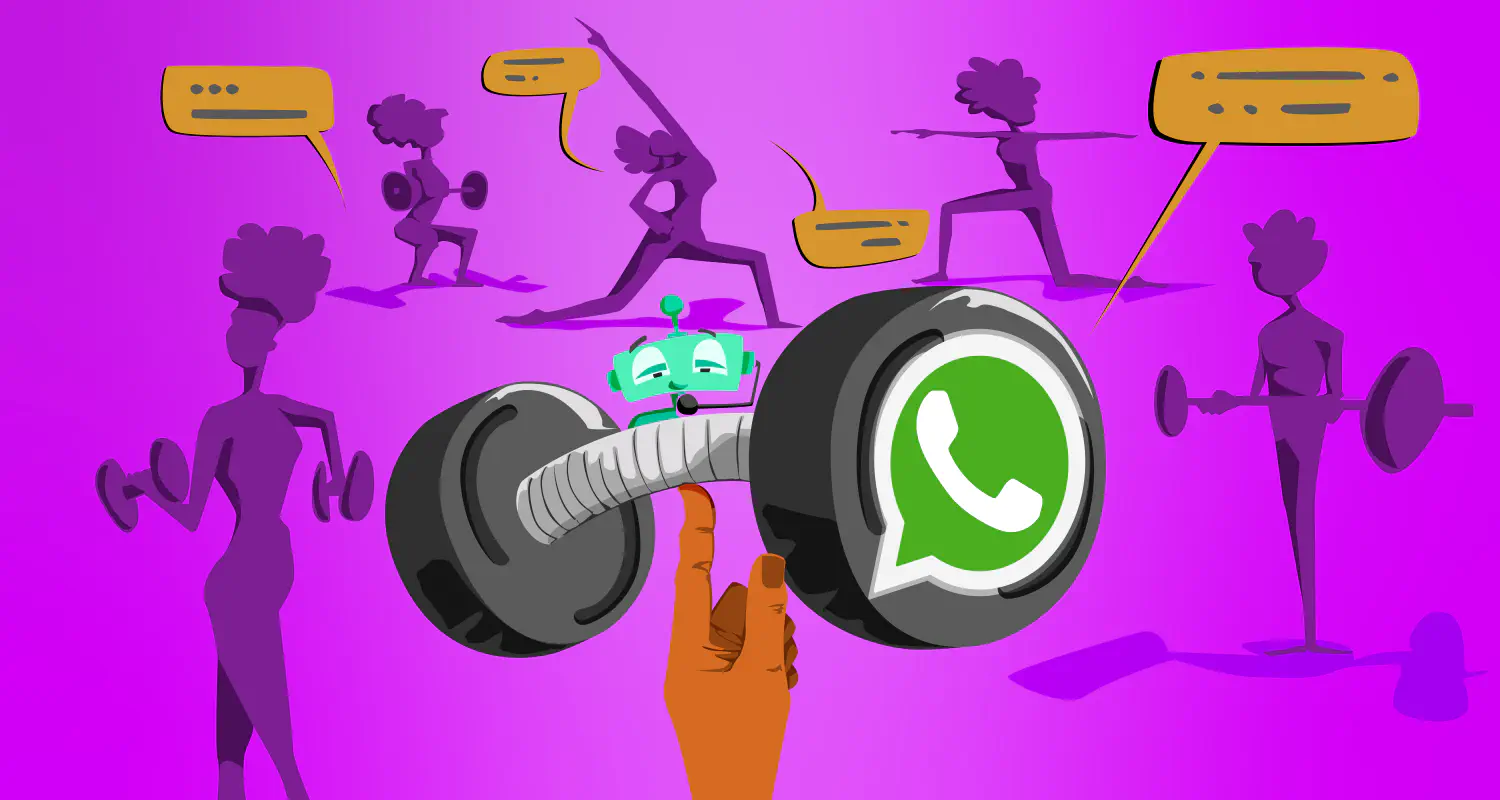WhatsApp Business for Healthcare: A Complete Guide {2025}
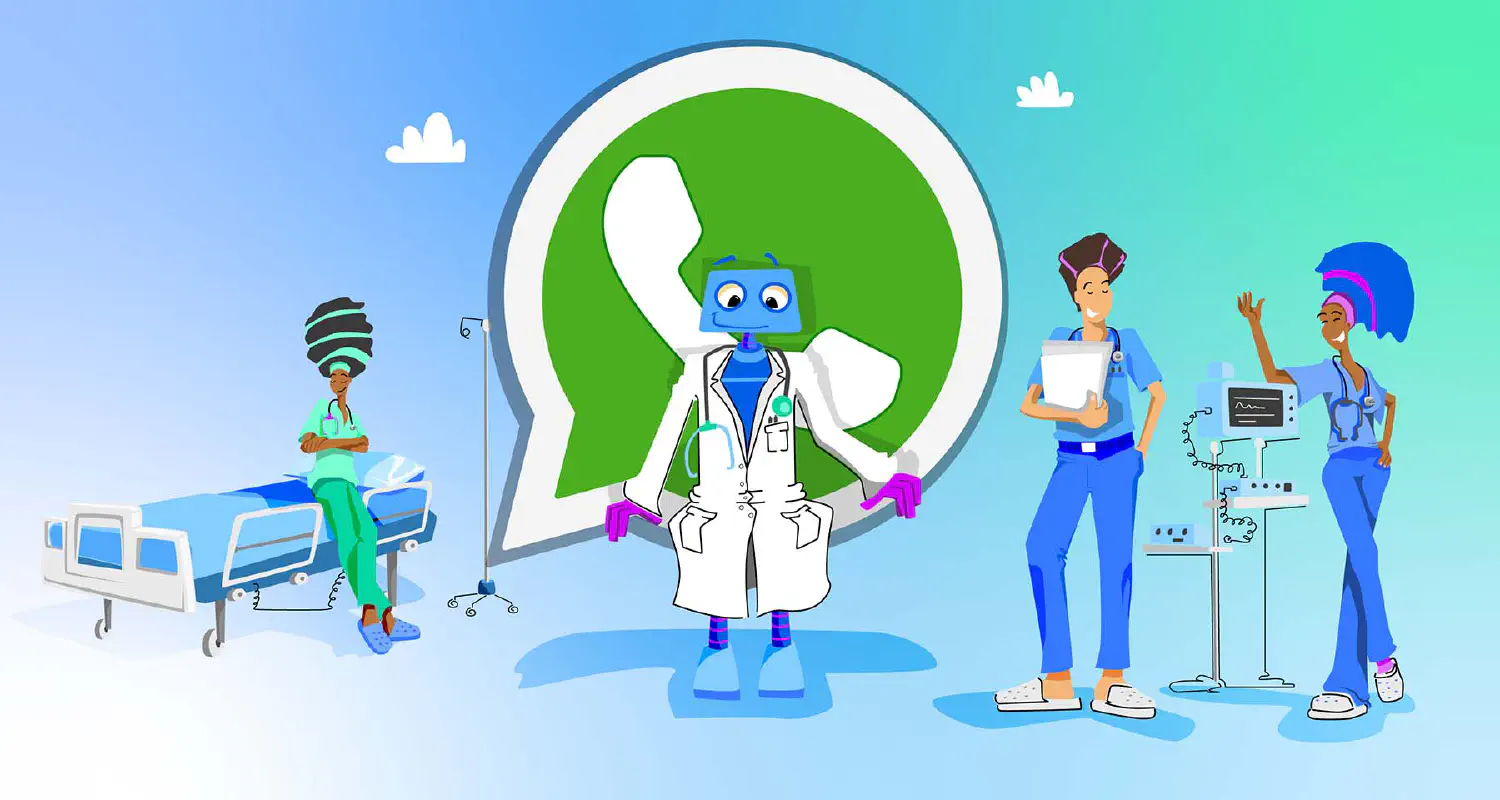
Over the past few years, digital technologies have increasingly influenced the healthcare industry. This trend was accelerated by the COVID-19 pandemic, which necessitated online communication to reduce physical contact. Even though the pandemic has subsided, WhatsApp for healthcare has become a common tool for business communications.
In March 2020, the World Health Organization (WHO) announced that it had launched WHO Health Alert to spread official information on the virus. The alert is a WhatsApp chatbot that answers questions and provides information on the latest news, vaccines, and health precautions regarding COVID-19.
If the world’s biggest healthcare institution can benefit from WhatsApp for its patient communications, smaller healthcare businesses can, too.
Role of WhatsApp in Healthcare
WhatsApp has changed the game in how doctors and patients talk to each other. It’s the most popular messaging app, so most people already know how to use it. This makes it easy for patients to get in touch with their healthcare providers, whether it’s for booking appointments, getting test results, or just asking questions.
What’s cool is that WhatsApp isn’t just about sending messages. Chatbots can get information on your symptoms or schedule doctor’s appointments. This is great because it means your doctors and nurses have more time to deal with the big stuff.
And let’s not forget how WhatsApp helped out during COVID-19. For healthcare providers, it became a critical tool to keep in touch with patients without needing them to come to the clinic.
Why Use WhatsApp Business for Healthcare
Before we discuss use cases for WhatsApp chatbots in healthcare, it’s important to note that WhatsApp Business API is essential if you’re looking to implement a WhatsApp chatbot. Chatbots are not supported by the standard WhatsApp Business app.
Read our recent post if you want to learn how to create a WhatsApp Chatbot. Here are some of the common use cases for WhatsApp chatbots in healthcare:
Symptom Аssessment
When patients need a healthcare professional and contact a clinic, a chatbot could ask them about their symptoms and store the information for the healthcare professionals. Think about a mental health clinic that needs to learn about the patient’s symptoms to connect them with the doctor specializing in their case. It could use the WhatsApp reply buttons to make it easy for patients to reply.
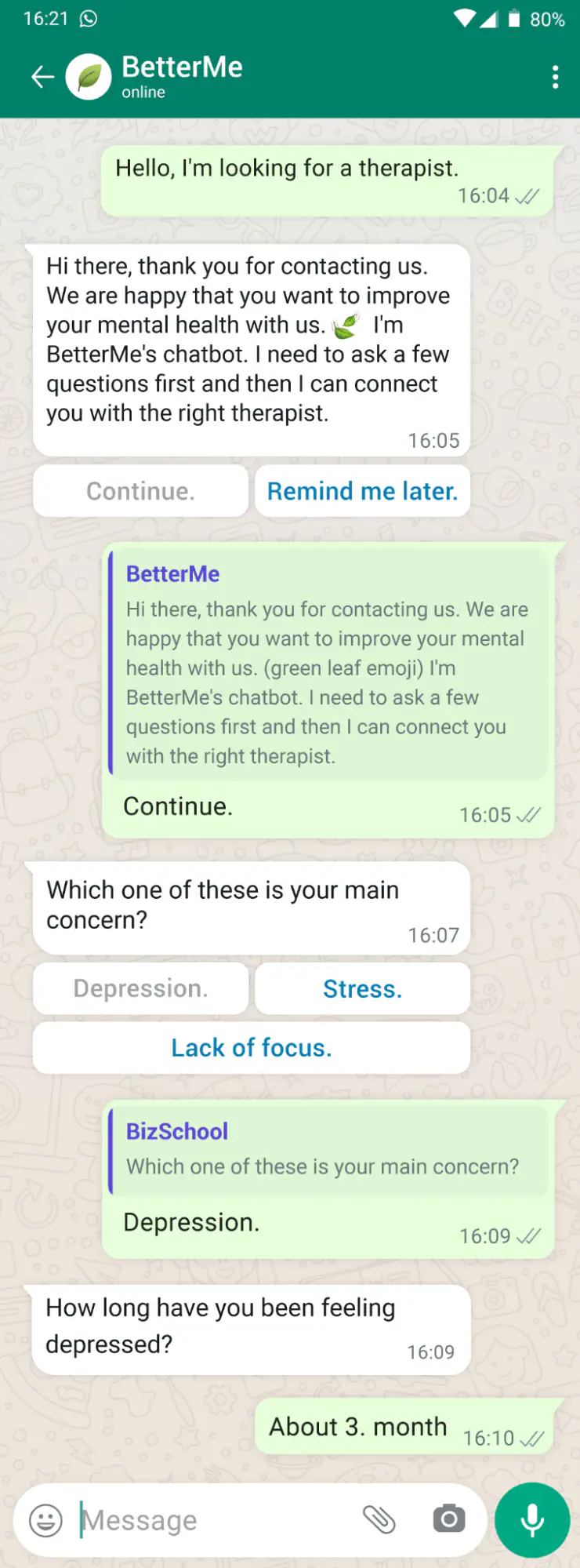
Medical Document & Test Result Distribution
WhatsApp has rich media capabilities that healthcare businesses can leverage. Sometimes, it’s hard or impossible for the patients to visit a clinic. Sending them their prescriptions and test results on WhatsApp can save them trouble.
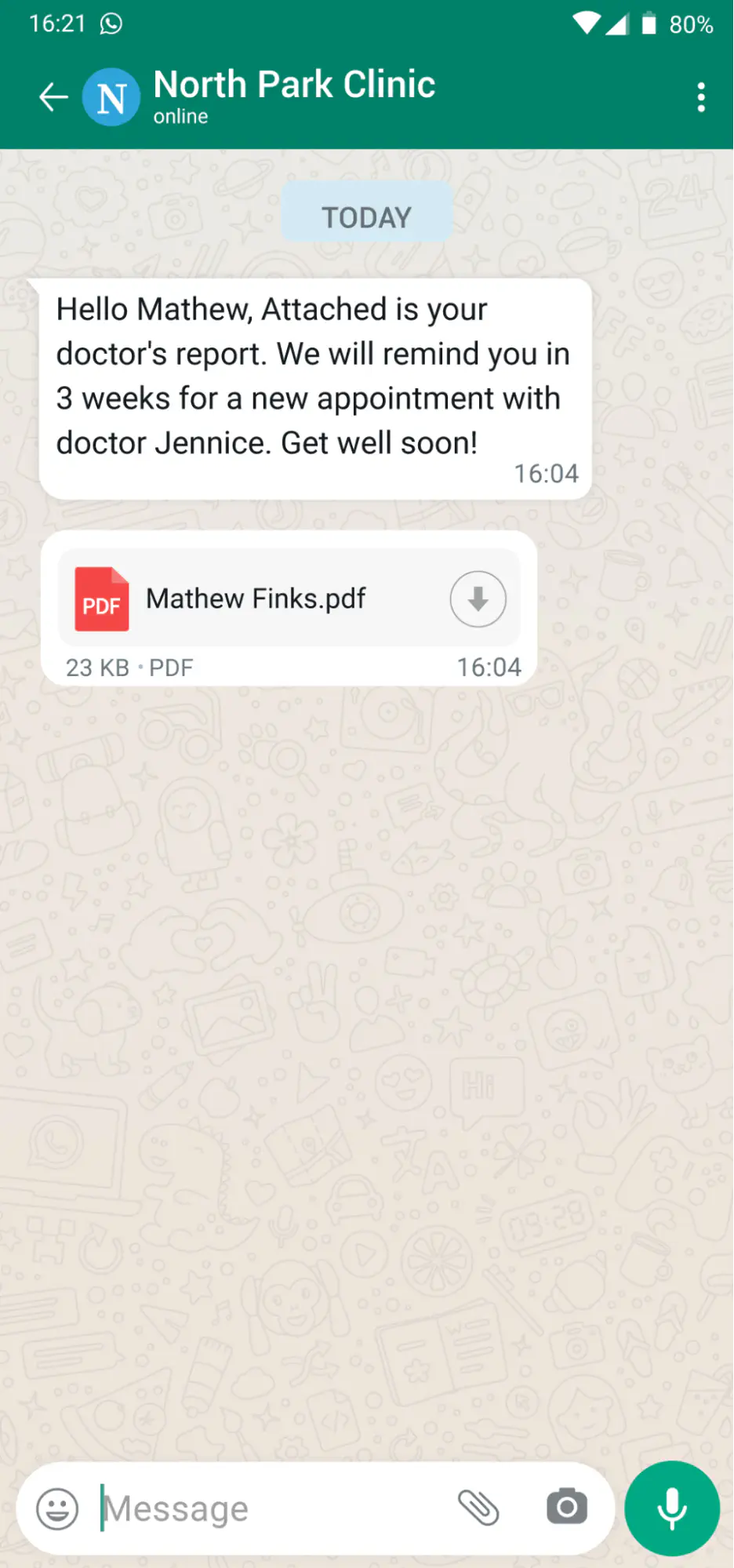
In cases of medical tourism, it may not be feasible for patients to travel to another country only for a checkup. Practitioners can instead ask for their medical documents and photos over WhatsApp.
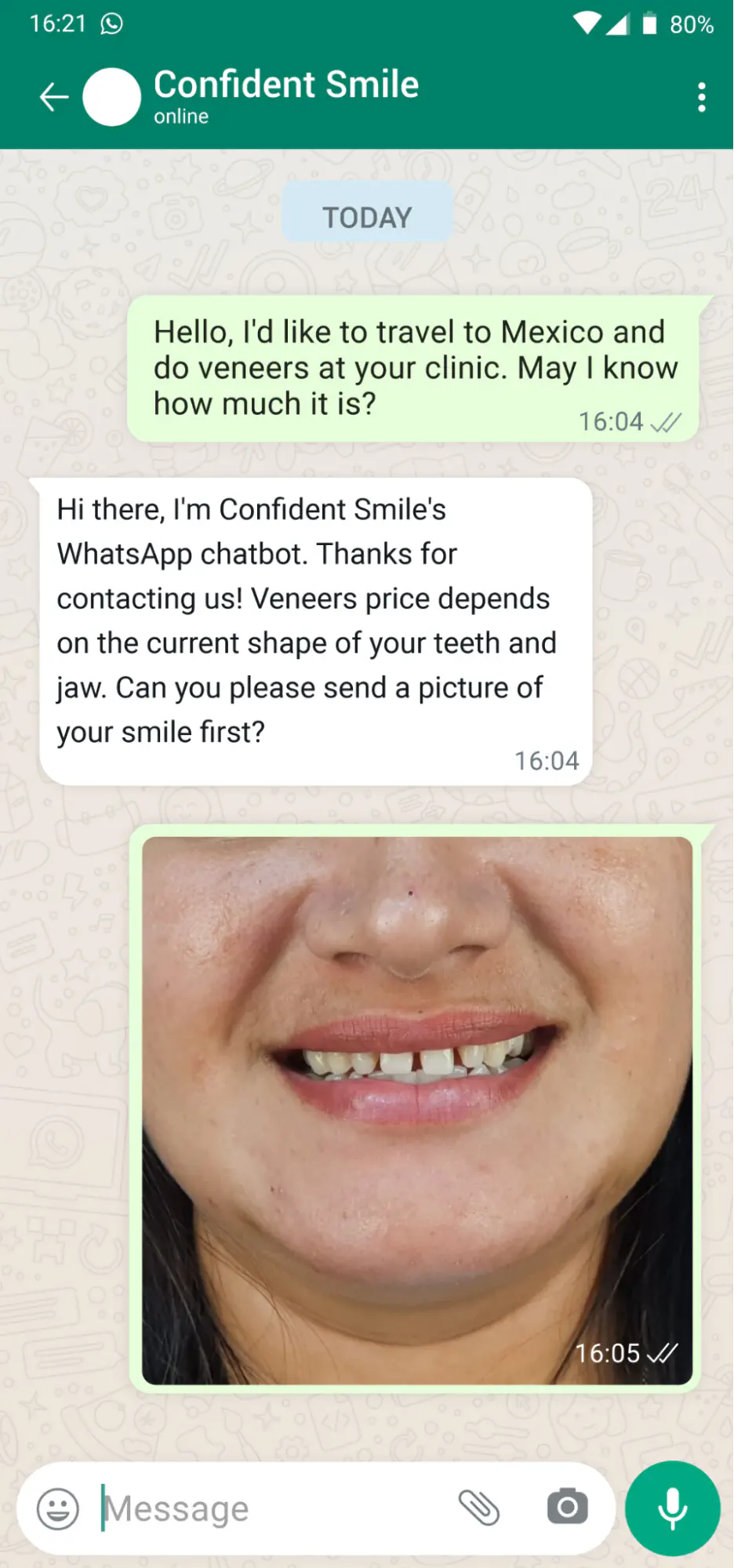
Automated Appointment Booking
Booking appointments is one of the most repetitive tasks for a healthcare business. It needs no human interaction and therefore makes a great case for a chatbot. When patients message you on WhatsApp to make an appointment, your bot could give them a list of available slots from your calendar using WhatsApp’s list message. They select the fitting slot, and an appointment is automatically made.
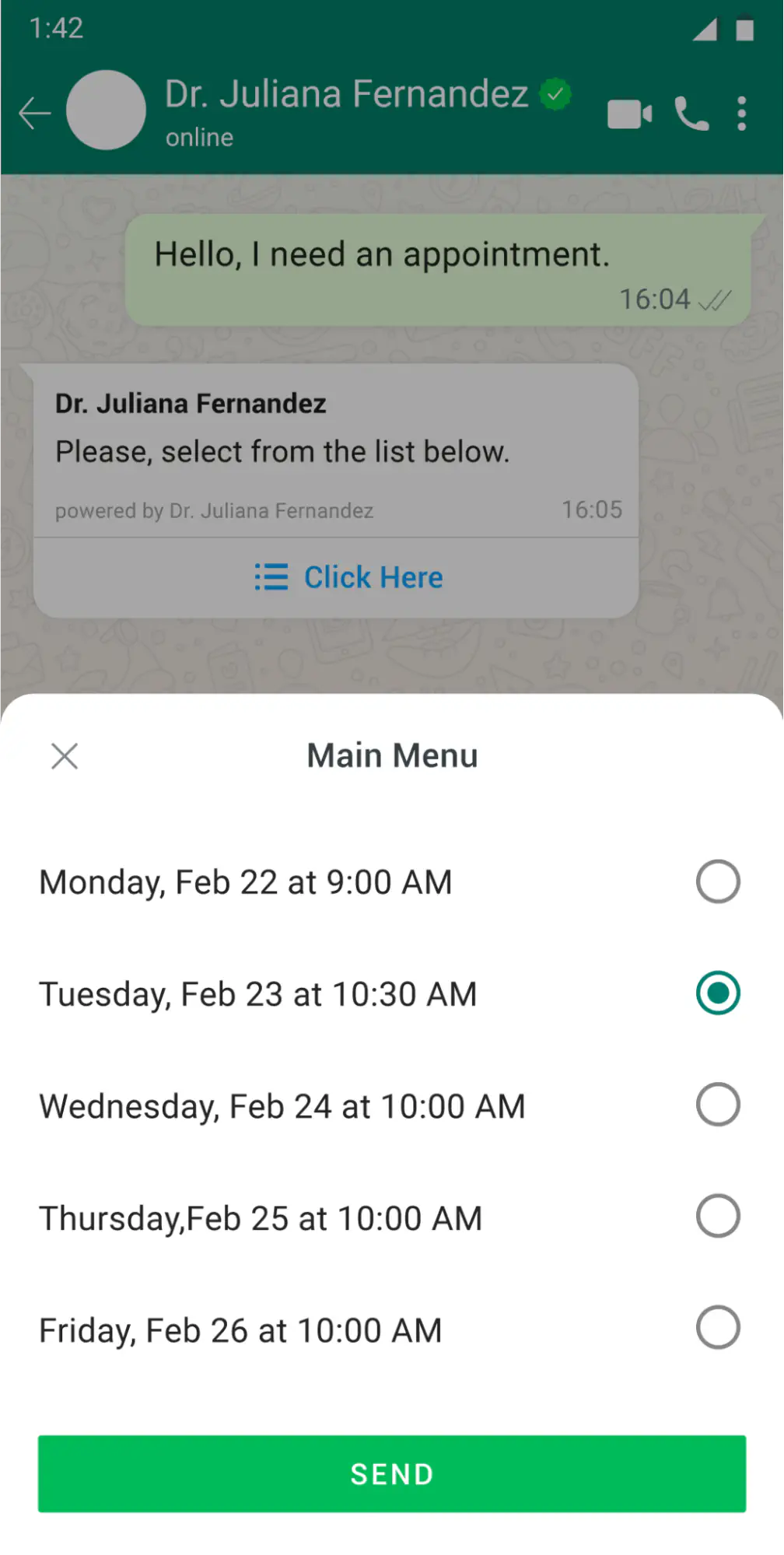
To learn more about list messages and other interactive WhatsApp messages, please read our guide for interactive WhatsApp messages.
Reminders
One or two days before the scheduled appointment, a bot could send a reminder to the patients. They could also ask for another reminder that is closer to the scheduled date and time.
Another type of notification can be a medication reminder. Forgetting to take medication is a common problem for many patients. After a doctor prescribes medicine for a patient, a WhatsApp bot could send them regular reminders.
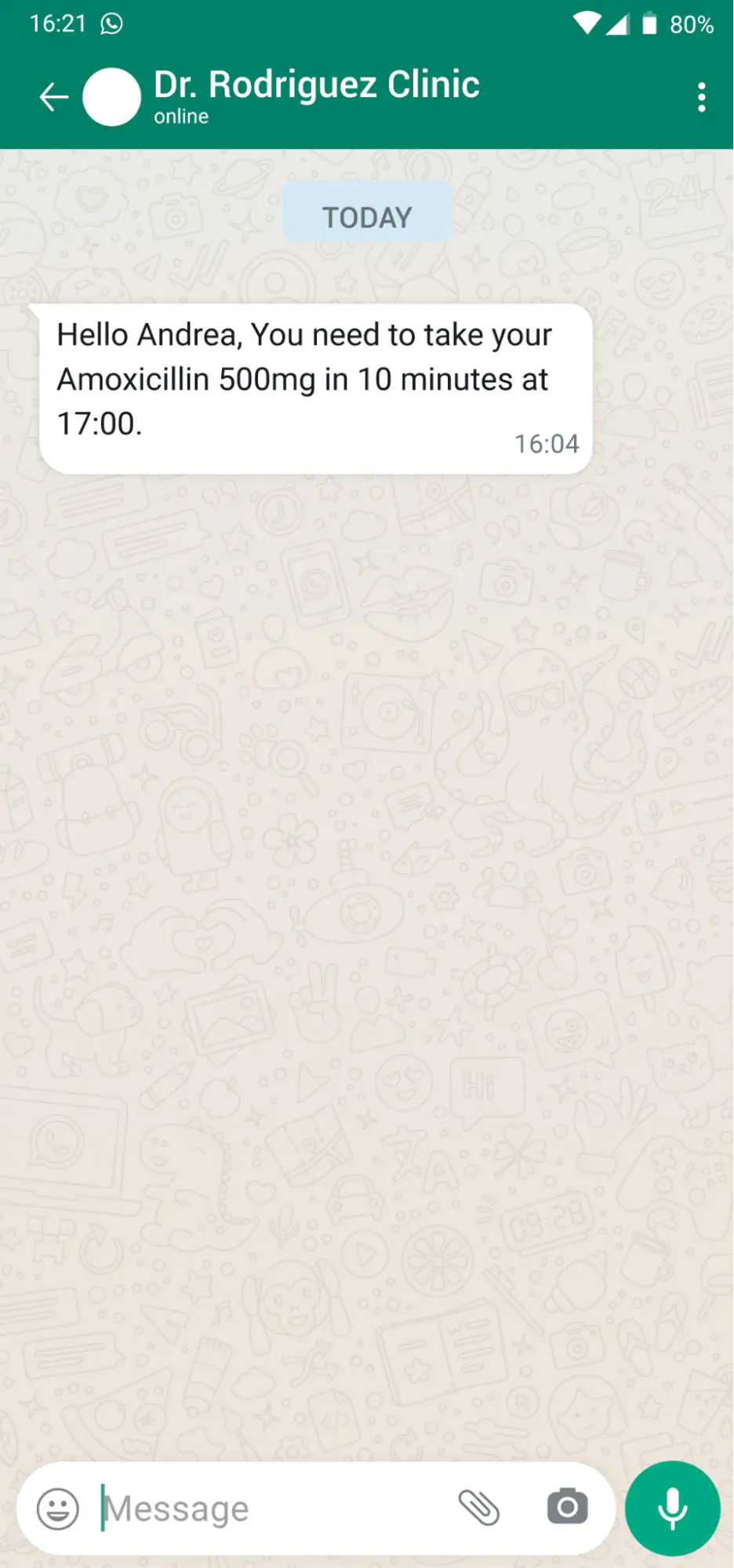
Health Insurance Quotation
Healthcare clinics and hospitals are not the only ones that could benefit from a WhatsApp chatbot. Insurance companies could automate a bot to ask customers qualifying questions and offer relevant health insurance with quotes and criteria.
FAQ Handling
One of the most common use cases of a bot is to answer common questions. Take a look at the most common questions you receive from customers. Which ones don’t need a human agent? Questions regarding your location, opening hours and fees are some that could be handled by a bot.
Online Payments in Healthcare
Nobody likes to wait in line in a hospital to make a payment. Why not automate that, too? Whenever it’s time to make a payment, your WhatsApp bot could send them an invoice and give them payment options. Patients could then pay from their phones and upload a receipt if needed.
Setting Up a WhatsApp Chatbot for Healthcare
If you want to set up a WhatsApp chatbot, you need access to WhatsApp Business API and an inbox or a CRM for customer communications. Rasayel is a WhatsApp inbox that lets you communicate with your customers over WhatsApp as a team. It offers features such as bulk messaging, a chatbot builder, reports, automation rules, and more.
Create a Chatbot Flow
As we delve into creating a practical chatbot flow, this step-by-step guide will walk you through the process of designing a chatbot specifically for scheduling doctor’s appointments in your clinic. This guide is designed to be straightforward to follow, ensuring that even those with minimal technical expertise can successfully create an efficient chatbot.
By the end of this guide, you’ll have a functional chatbot ready to streamline your appointment scheduling process.
🤔 Do you want to enhance patient communication?
We’ve got the secret weapon: WhatsApp chatbots! 👋 Personalized care, 24/7 support, and boosted engagement. 📈
Set up your chatbot for free!
Chatbots in Healthcare: Compliance & Security
In the healthcare sector, where patient data sensitivity and privacy are paramount, integrating WhatsApp chatbots requires strict adherence to compliance and security standards. Here’s what you need to consider:
HIPAA
Ensuring Compliance with HIPAA and Other RegulationsSecurity
Data Security and Patient ConfidentialityPrivacy
Best Practices for Privacy and SecurityEnsuring Compliance with HIPAA & Other Regulations
Navigating the complexities of legal compliance is a critical aspect for healthcare providers using WhatsApp chatbots. Here’s a breakdown of the key compliance areas:
- HIPAA: In the United States, the Health Insurance Portability and Accountability Act (HIPAA) sets the standard for protecting sensitive patient data. You must ensure that your WhatsApp chatbot complies with HIPAA regulations, which involve safeguarding patient information and ensuring confidentiality.
- Local Regulations: Different countries have regulations similar to HIPAA. You must understand and comply with local laws regarding patient data protection and privacy.
- Training and Policy Implementation: Your staff should be trained on the importance of these regulations and how to use chatbots in a way that remains compliant. This includes understanding what information can be shared and how it should be protected.
Data Security & Patient Confidentiality
Safeguarding patient information is not just a best practice, but a necessity. Here are some essential measures to ensure these standards are met:
- Encryption and Data Protection: WhatsApp offers end-to-end encryption, which is essential for maintaining patient confidentiality. However, additional measures should be taken to secure data at rest, such as when patient information is stored in databases.
- Access Control: Strict access controls should be implemented to ensure that only authorized personnel can access sensitive patient data. This includes robust authentication mechanisms for users accessing the chatbot’s backend systems.
- Regular Security Audits: Conduct regular security audits to identify and address potential vulnerabilities in the chatbot system. This helps in maintaining a secure environment for patient data.
Best Practices for Privacy & Security
In healthcare, where patient privacy is of utmost importance, implementing best practices for privacy and security is critical when using WhatsApp chatbots.
- Clear Privacy Policies: Inform patients about the data the chatbot collects, how it will be used, and whom it will be shared with. Transparency is key to maintaining trust.
- Consent Management: Obtain explicit consent from patients before collecting or using their personal health information through the chatbot. This consent should be documented and easily accessible.
- Minimum Necessary Data: Collect only the data that is necessary for the intended purpose. Avoid storing excessive information that could increase risk in case of a data breach.
- Data Retention Policies: Implement strict data retention policies, ensuring that patient data is not kept longer than necessary and is securely disposed of when no longer needed.
Conclusion
Building a WhatsApp chatbot for healthcare can be the key to improving patient engagement, streamlining operations, and reducing costs. However, it is important to address compliance and security concerns when using chatbots in healthcare.
Overall, integrating WhatsApp chatbots into the healthcare industry represents a significant opportunity to enhance patient care, improve efficiency, and drive better outcomes. With careful planning and implementation, healthcare providers can harness the power of this technology to create a more accessible and convenient experience for their patients.
Frequently Asked Questions
WhatsApp chatbots can significantly improve healthcare services by providing easy and quick communication between patients and providers. They are useful for scheduling appointments, symptom assessment, distributing medical documents, and sending medication reminders, thereby increasing efficiency and patient satisfaction.
Key use cases include symptom assessment, distributing medical documents and test results, automated appointment booking and reminders, providing health insurance quotations, handling frequently asked questions, and facilitating online payments in healthcare.
To comply with HIPAA and other local regulations, healthcare providers must ensure that their WhatsApp chatbots safeguard patient information and maintain confidentiality. This includes staff training, policy implementation, and ensuring that chatbot operations align with legal standards.
To set up a WhatsApp chatbot, you’ll need a Facebook Business account, a phone number meeting Meta’s criteria, access to WhatsApp Business API or Cloud API, and a team inbox like Rasayel for customer communications.
Learn more
If you'd like to learn more about how WhatsApp can help you grow your business, please reach out to us on WhatsApp at +13024070488 (Click to chat now).
We also offer a free consultation session where we review your use case, answer any questions about WhatsApp, and help you build a strategy to make the best out of the platform. Book a call with us here. We'd love to speak with you:
Book a call: Europe, the Middle East, and Africa
Book a call: LATAM
Curious about Rasayel? Schedule a demo today.

Miodrag is a seasoned WhatsApp marketing expert with over 15 years of experience in B2B sales and communication. Specializing in the use of WhatsApp Business API, he helps businesses use WhatsApp’s marketing features to grow their sales and improve customer engagement. As one of the early adopters of WhatsApp Business, Miodrag has a deep understanding of its tools and strategies, making him a trusted authority in the field. His insights have helped many businesses with their communication strategies to achieve measurable results.



